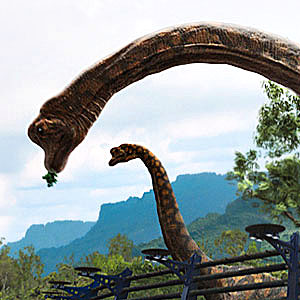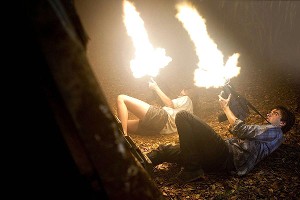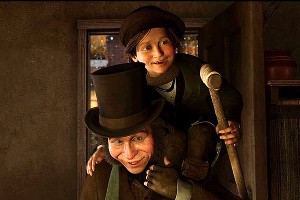Of course "Terra Nova" is just an absurd television show. But since Fox promoted it as the most expensive program ever made, "Nova" merits an absurd level of scrutiny.
The show -- which just had its season and perhaps series finale -- once again demonstrates the contemporary Hollywood maxim: millions for special effects, skimp on writing. Ye gods, was "Terra Nova" poorly plotted and poorly written. Since there were a ridiculous 12 credited producers, the producers are more to blame than the writers. But bottom line is what matters, and bottom line is that the plotting and dialogue of "Terra Nova" were an industry low.
After a full season, viewers learned next to nothing about the world of 2149 -- that is, the science fiction part. What was America like? What direction was global society headed? No clue. Viewers were told that the adversary of the West is "Russo-China," and that a civil war just happened in Somalia -- which makes it seem hardly anything has changed in more than a century. All we really find out about the United States of 2149 is that it can build a time machine but not control air pollution -- a problem already declining rapidly -- and that no one in the year 2149 has a sense of humor. The entire season of "Terra Nova" went by without a joke. Sense of humor was essential to the success of "Star Trek" and "Stargate," sci-fi serials that, unlike "Terra Nova," were very popular and earned more money than they cost.
Adding humor and speculation about the future to "Terra Nova" would have required something today's Hollywood abhors: originality. Viewers did get chase scenes, fight scenes, people walking into obvious traps, a sinister evil corporation with unlimited power, and a cartoonish chief villain (the "Big Bad," to scriptwriters) who in the finale is shot twice in the chest at close range, in a scene in a jungle far from medical care -- and then in the cliffhanger, we learn he's alive and will strike again!
"Terra Nova" had many of the standbys of "Star Trek" and "Stargate," without the compensating humor and intelligent plots. On "Terra Nova," like on "Star Trek," the radios and power fail constantly. The "captain" character goes on "away" missions, including leaving the settlement alone on two occasions. When we see a security guy we've never seen before, he is sure to die. Small amounts of electricity are carried by super-large cables, just like in the 1966 "Star Trek" pilot. The time portal looks and functions like a Stargate: characters even refer to "unscheduled activation," a key "Stargate" phrase. A secure facility has an air shaft you can crawl out through -- and it's lighted!
It's the mid-22nd century, yet idioms have not changed. Characters say "I'm done," "a world of hurt," "ginormous," "I'm running late," "back at you" and "clicks" to mean kilometers. Think how different typical speech was in 1873, which was as far backward as "Terra Nova" goes forward. Yet the 22nd century people of "Terra Nova" talk exactly like Southern California mall customers of the present day.
The use of today's lingo not only represented a failure of imagination but a missed marketing opportunity. "Terra Nova" should have contained future slang -- made-up words the characters would use without explanation, that viewers would figure out from context. Made-up vocabulary is a factor in the ratings success of "Game of Thrones." Made-up future slang might have entered social-network culture as memes, which would have gotten young people talking about "Terra Nova" and watching so they could be first to hear and use the next bit of future slang. Instead, people from the year 2149 said "ginormous."

In the pilot, viewers are told the peaceful Terra Nova colony has only a few small jeeps and no other vehicles. Yet in the finale, suddenly the good guys have many vehicles including a giant truck -- where did these come from? There are roads all around Terra Nova, though road-building equipment is never seen, while ditches are shown being dug with shovels. Who built the roads? In the pilot, imminent death by man-eating thunder lizard is depicted as awaiting anyone who steps outside the colony walls without weapons. By late in the season, many characters are roaming around the jungle unarmed, without the slightest inconvenience. Where did all the dinosaurs go?
Often, viewers are told that the past is "waiting" for the future to send something or someone back, or that an action by the future will "happen in three days" or some such. The future has a time machine! Supply shipments departing over a period of years from the standpoint of the future could all arrive in the past on the same day. For that matter when the mercenaries of a Generic All-Powerful Evil Corporation come back to the past to seize booty, they had no reason to materialize outside the Terra Nova colony and go to war with its noble soldiers. The mercenaries could have used the time machine to materialize before Terra Nova was built, then grabbed whatever they wanted at their leisure. Instead they traveled backward in time to the only point in millions of years when they would be opposed by force.
When the mercenaries show up, their plan is to "strip-mine this world for its resources," their sinister leader says. That also was the plan of the evil mercenaries in "Avatar," a movie that begins in the year 2148. Right now all primary resources on Earth, except for freshwater and groundwater, are in plentiful supply. Perhaps there will be some chain of events that causes resource exhaustion; it seems more likely that advances in technology will reduce resource waste, while improving access to deposits that today are out of reach. Even so, if resources are the issue, Antarctica and the moon offer a vast reserve, which ought to be attainable in cost-effective ways by the 22nd century.
Instead on "Terra Nova," society builds an immense time portal complex, said to be half the size of Chicago, and in "Avatar" society builds a fantastic fleet of interstellar spacecraft, to go far into the past or deep into the galaxy in search of stuff that's cheap. Of course Hollywood traffics in shallow thinking. But "we want to steal their resources" was what governments and crown corporations thought in the 19th century. Trends in science and technology are making intellectual property more valuable than natural resources. Hollywood doesn't seem aware of this.
What, specifically, do the mercenaries desire from 85 million years in the past? Iron. "Gentlemen, we will be rich," the mercenary leader cackles as pallets holding 90 tons of iron come through the portal to 2149. I'd love to think this was a sly joke by the producers, since iron ore is among the most plentiful substances in Earth's surface, while iron oxide is common on the surface of the Moon. Sadly, Terra Nova producers gave no hint of wit; they seem more likely to think iron is the kind of thing evil capitalists would plunder. At current prices, 90 tons of iron ore is worth about $12,000. On the TNT alien-invasion series Falling Skies, a battle fleet of enormous faster-than-light starcruisers has come to Earth and destroyed the world's militaries, in order to steal -- scrap metal, for its iron.
Then there's the fingerless gloves. The commander of the Terra Nova settlement -- whose political structure is never explained; he's just a commander everyone obeys, whereas actual colonies have been hotbeds of political debate and utopian theorizing -- always wears fingerless gloves. This is not for warmth: The Cretaceous period depicted in the show was warm. The gloves are to make him seem a tough guy. "Falling Skies," like "Terra Nova" claiming Steven Spielberg as executive producer, also has its macho protagonist wear fingerless gloves. Have you ever observed anyone wearing fingerless gloves, other than Bob Cratchit?
These days one could save time by listing the shows and movies that don't give Spielberg a vanity credit. Apparently when Spielberg sells his name to a sci-fi production, he says: "Have the macho guy wear fingerless gloves. Have good-looking teenagers be chased by obviously fake computer-animated monsters. Have a family secret in the backstory, and a plotline that makes no sense. That will be $1 million, please."
"Terra Nova" is a long shot to be renewed. If it is canceled, viewers will never find out how the mysterious 16th-century wooden sailing ship ended up 85 million years in the past. The writers will never find out, either.


No comments:
Post a Comment